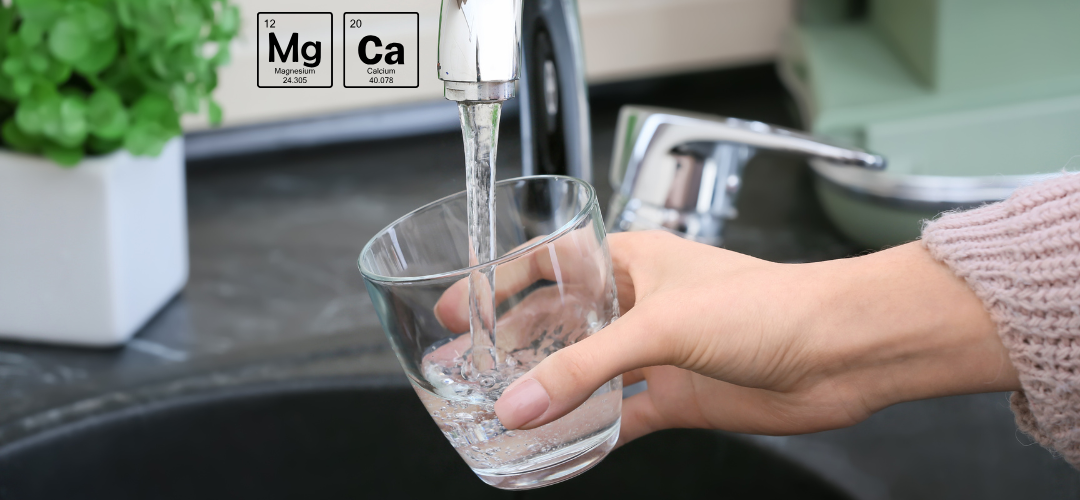on Orders over £25

How Your Tap Water Impacts Your Mineral Intake
The UK’s water supply varies widely by region, with some areas naturally having hard water and others soft water. Beyond taste and limescale, these differences influence how many minerals we get from our taps. This means that where you live could impact your intake of key nutrients like magnesium and calcium. This article covers the effects of your water supply on your nutrient intake and the ways in which factors like diet and supplements can help bridge any gaps.
Hard vs. soft water: What’s the difference?
Hard water and soft water are both perfectly safe to drink, but differ in mineral content. Hard water contains higher levels of dissolved minerals (mainly calcium and magnesium), which it picks up as it moves through limestone and chalk. This type of water is most common in the South and East of the UK, particularly around London and Kent. Soft water, found mainly in Scotland, Wales, and Northern England, has much lower mineral levels because it flows through granite or peat, which don’t release as many minerals.
Hard water and mineral intake
Hard water contributes trace amounts of calcium and magnesium, both of which are essential for bone, muscle, and nerve health. However, the levels present can vary and are generally too low to meet your daily intake requirements. This means that while these minerals are typically well absorbed, the overall contribution from drinking hard water alone is modest. So, while hard water can offer a small nutritional bonus, it shouldn’t be relied upon as a primary source of essential minerals in place of a balanced diet and supplement routine.
Soft water and mineral intake
Soft water contains fewer minerals, either naturally or as a result of water softening processes. If you live in a soft water area, your overall intake of magnesium and calcium may be slightly lower. This is especially true if you mostly drink filtered or bottled water. Over time, this reduced mineral intake, combined with other common dietary shortfalls, can contribute to small but noticeable nutrient gaps.
Beyond the tap: Other causes of low mineral intake
Even with mineral-rich water, modern diets can still fall short. Soil depletion and intensive farming have lowered mineral levels in crops compared to past decades. Plus, highly processed foods, refined grains, and reduced vegetable intake further impact nutrient quality and absorption. When you add regional water differences into the mix, maintaining consistent mineral intake, particularly of magnesium and calcium, can be more difficult than it seems.
How to stay balanced
To maintain balanced and optimal levels of key minerals, make sure to prioritise a diet rich in mineral-dense foods. For example, some plant-based options include nuts, seeds, leafy greens, and fortified plant milks. Additionally, supplementation can offer a steady, reliable source of nutrients to bridge any gaps in your daily diet. This may be particularly beneficial if you live in a soft water region or use a filtration system. When searching for the right supplements, look for high-quality formulas designed to complement a healthy lifestyle rather than replace good nutrition.
Key takeaways
- The UK’s water supply varies by region, with some areas naturally having hard water and others soft water.
- Hard water contains higher levels of calcium and magnesium, while soft water has much lower mineral content.
- Hard water can provide a small nutritional boost, but the amount of minerals it contributes is generally too low to meet daily needs.
- Soft water may slightly reduce overall magnesium and calcium intake, especially if mostly drinking filtered or bottled water.
- Reduced mineral intake from water, combined with dietary gaps, can contribute to subtle nutrient deficiencies over time.
- Factors like highly processed foods, soil depletion, refined grains, reduced vegetable consumption, and intensive farming have all made consistent mineral intake more challenging.
- Eating mineral-rich foods like nuts, seeds, leafy greens, and fortified plant milks can help maintain balanced mineral levels.
- Supplements can provide a reliable source of nutrients to fill gaps, especially for those in soft water areas or using filtration systems.

